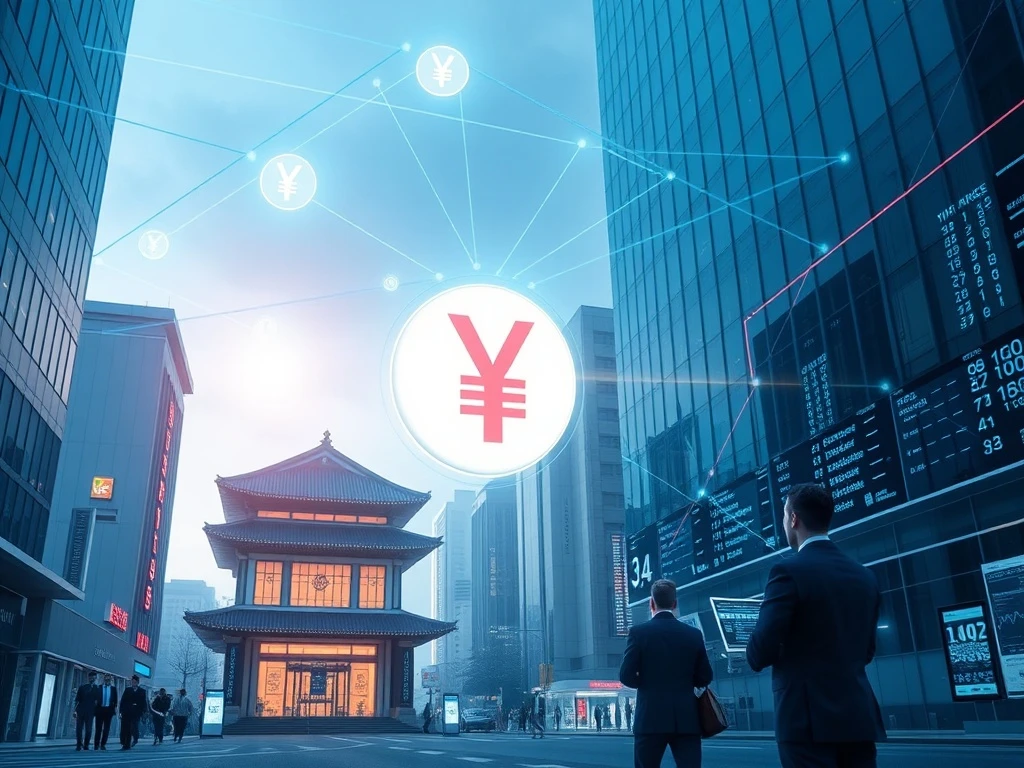Japan’s financial revolution accelerates as DCJPY, the yen-backed digital currency, creates unprecedented institutional crypto exposure opportunities through regulated tokenized assets. This strategic move positions Japan to capture an $18.9 trillion real-world asset market by 2033, offering global investors secure access to blockchain-based financial innovation.
DCJPY: Revolutionizing Institutional Crypto Exposure
Japan Post Bank’s DCJPY initiative transforms how institutions access digital assets. By tokenizing ¥190 trillion in deposits, DCJPY provides instant liquidity and seamless settlements. Consequently, institutions gain regulated exposure to crypto markets without traditional banking inefficiencies. The platform operates within Japan’s robust regulatory framework, ensuring compliance and stability. Moreover, DCJPY serves as a hedge against yen depreciation while offering yield opportunities.
Regulatory Framework Enhancing Institutional Confidence
Japan’s regulatory advancements create a secure environment for institutional crypto exposure. The 2023 Payment Services Act amendments mandate stablecoin collateralization with low-risk assets. Additionally, Financial Instruments and Exchange Act reforms clarify tokenized real estate as securities. These measures have already spurred ¥193 billion in tokenized real estate transactions. Furthermore, proposed tax reductions from 55% to 20% on crypto gains incentivize institutional participation.
Strategic Infrastructure for Tokenized Asset Trading
SBI Holdings and Startale Group launched a 24/7 onchain trading platform specifically for institutional crypto exposure. This platform enables:
- Real-time settlements for tokenized stocks and RWAs
- Fractional ownership of high-value assets
- Reduced counterparty risk through blockchain verification
- Enhanced liquidity through continuous trading
The infrastructure integrates traditional financial systems with blockchain technology, ensuring institutional-grade security and compliance.
Market Projections and Growth Opportunities
The Asia-Pacific region leads global RWA tokenization with projected $65 billion TVL by 2025. Japan’s market potential reaches $18.9 trillion by 2033 through tokenized infrastructure, real estate, and supply chains. Major corporations like Toyota already implement blockchain inventory systems. Similarly, SBI’s Project Trinity advances delivery versus payment mechanisms for security tokens. These developments create massive institutional crypto exposure opportunities.
Global Competitive Advantages
Japan’s institutional crypto exposure strategy outperforms other markets through regulatory clarity and technological infrastructure. The Financial Services Agency introduced stablecoin issuer licensing and plans yen-backed Bitcoin ETFs for 2026. Sumitomo Mitsui Financial Group partners with Ava Labs and Fireblocks for stablecoin development. These initiatives align with global standards while maintaining Japanese regulatory rigor. Consequently, foreign capital flows into Japan’s digital asset ecosystem.
Implementation Challenges and Solutions
Despite advantages, institutional crypto exposure faces interoperability and privacy challenges. The Canton Network addresses these issues through:
- Cross-chain transaction capabilities
- Regulatory compliance integration
- Privacy-preserving technologies
- Institutional-grade security protocols
These solutions ensure seamless operation within existing financial frameworks while enabling innovation.
Future Outlook and Strategic Recommendations
Japan’s DCJPY ecosystem positions the nation as a global leader in institutional crypto exposure. Investors should prioritize platforms integrating blockchain with traditional infrastructure. Early movers gain advantages in tokenized real estate and infrastructure projects. Additionally, monitoring regulatory developments remains crucial for strategic positioning. The convergence of technology, regulation, and market demand creates unprecedented growth opportunities.
Frequently Asked Questions
What is DCJPY and how does it enable institutional crypto exposure?
DCJPY is Japan Post Bank’s yen-backed digital currency that tokenizes deposits to provide instant liquidity and regulated access to tokenized assets, creating secure institutional crypto exposure pathways.
How does Japan’s regulatory environment support institutional adoption?
Japan’s Payment Services Act amendments and Financial Instruments Exchange Act reforms provide clear legal frameworks for tokenized assets, reducing regulatory uncertainty for institutional participants.
What types of assets can institutions access through DCJPY?
Institutions can access tokenized real estate, infrastructure projects, supply chain finance instruments, and traditional securities through DCJPY’s blockchain infrastructure.
How does DCJPY address counterparty risk in crypto transactions?
DCJPY utilizes blockchain verification and instant settlement mechanisms to minimize counterparty risk, ensuring secure transactions for institutional participants.
What are the tax implications for institutions using DCJPY?
Japan proposes reducing crypto gains taxation from 55% to 20%, making institutional crypto exposure more financially attractive through DCJPY platforms.
How does Japan’s approach differ from other markets?
Japan prioritizes regulatory compliance and institutional-grade infrastructure over speculative trading, creating a more stable environment for long-term institutional crypto exposure.








